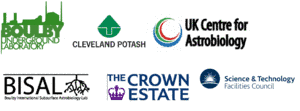MINAR 2 Three days event from 1st to 3rd of April 2013 at Boulby Mine, Cleveland, UK
March 19 2014


Boulby is a 1.1-km deep working potash mine in the north-east of the UK which has been dug into layers of halite and sulfate salts laid down in the Permian (250 Ma ago). The mining is operated by Cleveland Potash Ltd (CPL). In addition to commercial mining activity Boulby is host to the UK’s Boulby Underground Science Facility (BUSF), hosting a variety of science studies from astrophysics (the search for Dark Matter) to studies of geology, climate, the environment and beyond. Connected to BUSF, Boulby also hosts the Boulby International Subsurface Astrobiology Laboratory (BISAL), a permanent deep subsurface astrobiology/microbiology laboratory established by the UK Centre for Astrobiology in late 2011. The lab provides a means to collect and culture anaerobic organisms from subsurface halites and sulfates, study their physiology and prepare samples for transport to surface laboratories for detailed investigations.
Boulby mine contains sequences of halite and sulfate deposits, the interior of which are subjected to anaerobic conditions. Both halite and sulfate deposits have been identified on Mars.
The low water activity caused by the high salt concentrations on Mars has been proposed as a factor in constraining the habitability of Mars. Therefore investigations on organisms that naturally grow at in high salt concentrations and how they adapt to multiple extremes are of importance for Mars exploration. The salts in Boulby are exposed to transient water availability, although in some locations, water emanating from the deep subsurface results in permanent brine ponds that contain anaerobic salt deposits. These environments of high salt with transient water availability offer ideal locations for collecting samples from which to isolate organisms.
The main goal of this campaign is to collect new samples from analogue sites that have been identified by the MASE project team in order to isolate novel organisms to study effects of analogue conditions. This objective specifically relates to the SPACE call objective of using terrestrial space-analogue environments to better understand the limits of life and habitability potential of organisms in extraterrestrial environments.
By developing an analogue programme through this project, experience and expertise will be accumulated which will lead to a longer-term European and
international analogue research effort at Boulby.
Links:
Boulby International Subsurface Astrobiology Laboratory (BISAL)

